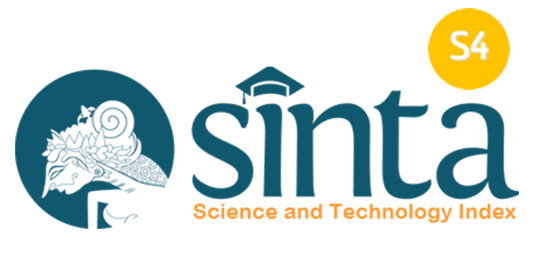EFFECT OF LEMON AROMATHERAPY IN PREGNANT WOMEN ON EMESIS GRAVIDARUM: A LITERATURE REVIEW
Downloads
Introduction: Pregnancy is a physiological event for a woman and in the first months of pregnancy, there is a feeling of nausea and vomiting (gravidarum emesis). Emesis complaints occur in 60-80% of primigravida and 40-60% of multigravida. Emesis gravidarum if not treated immediately can develop into hyperemesis gravidarum and can result in reduced fluids in the body, thus endangering the health of the mother and the development of the fetus. The purpose of this study is to examine scientific articles which discuss lemon aromatherapy in pregnant women to reduce emesis gravidarum. Methods: The method used in this study is a literature review with data collection techniques using PubMed and Scholar based on inclusion criteria, among others, the intervention in the form of giving lemon aromatherapy, using the quasi-experiment or pre-experimental design or literature review method, using Indonesian and English, published within 10 years (2017-2022). Keywords in the literature review used when searching "Pregnancy” AND "Emesis Gravidarum” OR "Lemon Aromatherapy”. Results: There were 37 journal articles found, and 9 articles that met inclusion criteria were reviewed. The results showed that based on the study conducted, can be seen that has the effect of giving lemon aromatherapy to reduce emesis gravidarum in pregnant women. This will stimulate the release of the beta-endorphin hormone to reduce the production of vomiting stimuli so that complaints of emesis gravidarum can be reduced. Conclusions: The provision of lemon aromatherapy given to pregnant women who experience mild to moderate emesis gravidarum can have an effect in the right way and technique. Lemon aromatherapy is given 2-3 drops, dripped onto tissue or cotton for 5-10 minutes, with 3 breaths. The application of lemon aromatherapy is expected to be applied in health and family services as a complementary therapy to reduce emesis gravidarum in pregnant women.
Carolin, B. T., Syamsiah, S., & Yuniati, R. (2020). The Effect of Citrus lemon Aromatherapy on Emesis Gravidarum Patient. STRADA Jurnal Ilmiah Kesehatan, 9(2), 599–604. https://doi.org/10.30994/sjik.v9i2.340
Dewi, W. S., & Safitri, E. Y. (2018). Pengaruh Aromaterapi Lemon terhadap Emesis Gravidarum di Praktik Mandiri Bidan Wanti Mardiwati. Jurnal Ilmiah Kesehatan, 17(3), 4–8. https://doi.org/10.33221/jikes.v17i3.173
Faridah BD, Aprizal Ponda, H. T. P. (2019). Pengaruh Minuman Jahe Terhadap Penurunan Frekuensi Emesis Gravidarum Pada Ibu Hamil Trimester I Di Wilayah Puskesmas Lubuk Buaya Padang Faridah. Jurnal Ilmiah Kesehatan Ar-Rum Salatiga, 4(1), 23–32. https://doi.org/10.36409/jika.v4i1.57
Fibriansari, R. D., Maisyaroh, A., & Widianto, E. P. (2022). Buku Pedoman Dokumentasi Keperawatan Berbasis 3S (SDKI, SLKI, SIKI) (K. Rosyidi (ed.)). KHD Production.
Harahap, N. R., Rauda, R., Nasution, P., Syari, M., & Pitriana, D. (2022). Pengaruh Aroma Terapi Lemon Terhadap Emesis Gravidarum. Indonesian Trust Health Journal, 5(2), 57–63. https://doi.org/10.37104/ithj.v5i2.103
Khadijah, S. R., Lail, N. H., & Kurniawati, D. (2020). Perbedaan Efektifitas Pemberian Aromaterapi Lemon dan Aromaterapi Peppermint Terhadap Ibu hamil Denga Mual Muntah Trimester I di BPM Nina Marlina Bogor, Jawa Barat. Jurnal Kebidanan, 1(2), 79–86. https://doi.org/10.46799/jhs.v1i2.22
Kustriyanti, D., & Putri, A. A. (2019). The effect of ginger and lemon aromatherapy on nausea and vomiting among pregnant women. Jurnal Keperawatan Soedirman, 14(1), 15–22. http://dx.doi.org/10.20884/1.jks.2019.14.1.868
Maesaroh, S., & Putri, M. (2019). Inhalasi Aromaterapi Lemon Menurunkan Frekuensi Mual Muntah pada Ibu Hamil. Jurnal Kesehatan Metro Sai Wawai, 12(1), 30–35. http://dx.doi.org/10.26630/jkm.v12i1.1741
Maheswara, A. N., Wahyuni, E. S., Istiqomah, & Kustiyati, S. (2020). Literature Review: Terapi Komplementer Akupresur Pada Titik Perikardium 6 Dalam Mengurangi Mual dan Muntah Pada Kehamilan. Jurnal Ners Lentera, 3(1), 40–50.
Maternity, D., Sari, D. Y., & Marjorang, M. U. (2016). Pengaruh Inhalasi Aromaterapi Lemon Terhadap Morning Sickness Pada Ibu Hamil Di Wilayah Kerja Puskesmas Tulang Bawang I Kecamatan Banjar Agung Kabupaten Tulang Bawang Tahun 2016. Jurnal Kebidanan Malahayati, 2(3), 115–120. https://doi.org/10.33024/jkm.v2i3.581
Natalia, L., Hariningsih, W., & Majiah, I. T. (2020). Effect of Reproductive Health Education on Adolescent Knowledge Level About Unwanted Pregnancy in Palalangon Village, Cianjur Regency. Journal of Vocational Nursing, 1(1), 57. https://doi.org/10.20473/jovin.v1i1.19909
Nurulicha, & Aisyah, S. (2019). Pengaruh Pemberian Inhalasi Lemon Terhadap Pengurangan Mual Muntah Pada Ibu Hamil Trimester I Di Pmb Lestari Cileungsi Kabupaten Bogor Tahun 2019. Jurnal Kesehatan Indra Husada, 8(1), 157–165.
Nurulicha, N. (2020). Pengaruh Pemberian Inhalasi Lemon Terhadap Pengurangan Mual Muntah Pada Ibu Hamil Trimester I Di Pmb Lestari Cileungsi Kabupaten Bogor Tahun 2019. Jurnal Kesehatan Indra Husada, 8(1), 157–165.
PPNI, Tim Pokja SDKI DPP. (2018). Standar Diagnosis Keperawatan Indonesia : Definisi dan Indikator Indonesia (Edisi 1 :).
PPNI, Tim Pokja SIKI DPP. (2018). Standar Intervensi Keperawatan Indonesia : Definisi dan Tindakan Keperawatan (Edisi 1).
Safajou, F., Soltani, N., Taghizadeh, M., Amouzeshi, Z., & Sandrous, M. (2020). The effect of combined inhalation aromatherapy with lemon and peppermint on nausea and vomiting of pregnancy: A double-blind, randomized clinical trial. Iranian Journal of Nursing and Midwifery Research, 25(5), 401–406. https://doi.org/10.4103/ijnmr.ijnmr_11_19
Safira, T., Yuanti, Y., & Arlym, L. T. (2022). Pengaruh Aromatherapy Lemon Terhadap Mual Pada Ibu Hamil Systematic Literature Review. Jurnal Kesehatan Indra Husada, 10(2), 54–62.
Sari, S. P., Sabarudin, U., Hartiningsih, S. S., & Wijayanegara, H. (2019). Perbandingan Pengaruh Inhalasi Aromaterapi Lemon dan Vitamin B6 Terhadap Penurunan Frekuensi Emesis Gravidarum pada Ibu Primigravida Trimester I. Jurnal Sistem Kesehatan, 5(71), 8–12. https://doi.org/10.24198/jsk.v5i1.23919
Siti Rofi’ah, Sri Widatiningsih, T. S. (2019). Efektivitas Aromaterapi Lemon untuk Mengatasi Emesis Gravidarum. Jurnal Kebidanan, 9(1), 9–16. https://doi.org/10.31983/jkb.v9i1.3814
Sudirman, N. Y., & Agustin, A. (2021). Aromaterapi Lemon Menurunkan Mual Muntah Pada Ibu Hamil Trimester I. Proceeding Book Seminar Nasional Interaktif Dan Publikasi Ilmiah, 1(2), 291–296.
Tanjung, W. W., Wari, Y., & Antoni, A. (2020). Pengaruh Akupresur pada Titik Perikardium 6 terhadap Intensitas Mual Muntah pada Ibu Hamil Trimester I. Jurnal Education and Development, 8(4), 265–270.
Tasya Hani Fatwa. (2018). Pengaruh rebusan jahe terhadap keluhan mual muntah ibu hamil. Jurnal Medika Hutama, 3(1), 48–59.
Vitrianingsih, V., & Khadijah, S. (2019). Efektivitas Aroma Terapi Lemon untuk Menangani Emesis Gravidarum. Jurnal Keperawatan, 11(4), 277–284. https://doi.org/10.32583/keperawatan.v11i4.598
Wahyuningsih, S. (2019). Buku Ajar Keperawatan Maternitas (A. Maisyaroh & K. R. MN (eds.)). KHD Production.
Wati, P. K., Susanti, V. D., & Karo, M. B. (2021a). Pengaruh Aromaterapi Lemon Mual Muntah Pada Ibu Hamil Trimester 1 Di Klinik Paramitra. PLACENTUM Jurnal Ilmiah Kesehatan Dan Aplikasinya, 9(2), 39–46. https://doi.org/10.20961/placentum.v9i2.51471
Wati, P. K., Susanti, V. D., & Karo, M. B. (2021b). Pengaruh Aromaterapi Lemon Mual Muntah Pada Ibu Hamil Trimester 1 Di Klinik Paramitra The Effect of Lemon Aromatherapy, Nausea and Vomiting on Trimester I Pregnant Women in Paramitra Clinic.
Widianto, E. P., Maisyaroh, A., & Fibriansari, R. D. (2022). The Experience of Nurses Conducting Nursing Assessments of Occupational Diseases in the Farm: A Phenomenological Study. Gaceta Medica De Caracas, 130(5), S921–S928. http://dx.doi.org/10.47307/gmc.2022.130.s5.9
Widyastuti, D. E., Rumiyati, E., & Widyastutik, D. (2019). Terapi Komplementer Akupresur Untuk Mengatasi Emesis Gravidarum Pada Ibu Hamil Trimester I Tahun 2018. Jurnal Kebidanan Indonesia, 10(1), 96. https://doi.org/10.36419/jkebin.v10i1.248
Copyright (c) 2023 Rizeki Dwi Fibriansari, Nurul Hayati

This work is licensed under a Creative Commons Attribution 4.0 International License.
Copyright Notice
1. The journal allows the author to hold the copyright of the article without restrictions.
2. The journal allows the author(s) to retain publishing rights without restrictions.
3. The legal formal aspect of journal publication accessibility refers to Creative Commons Attribution (CC BY).














